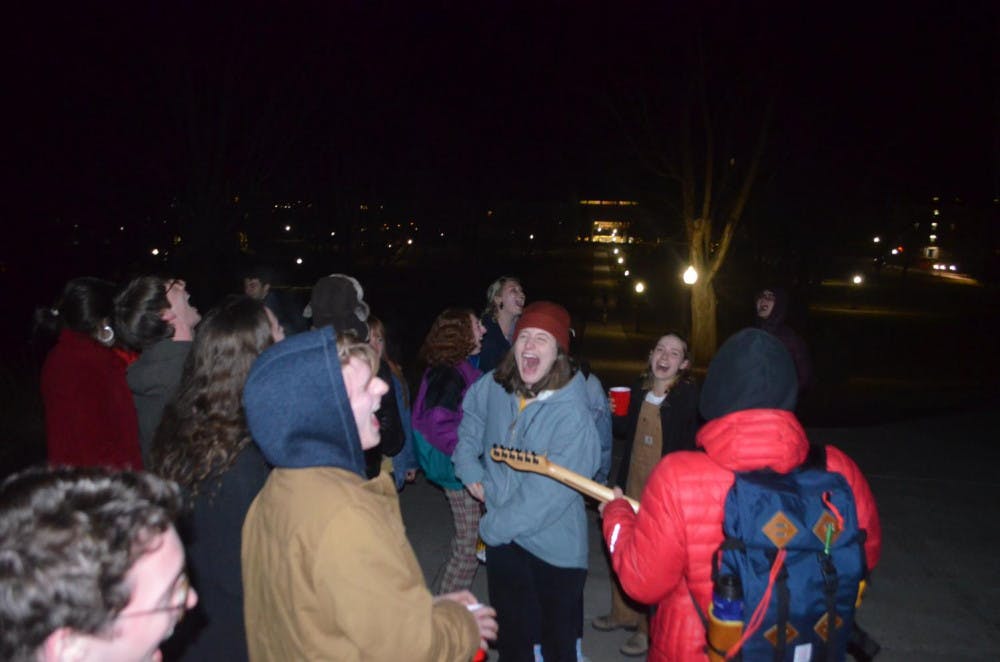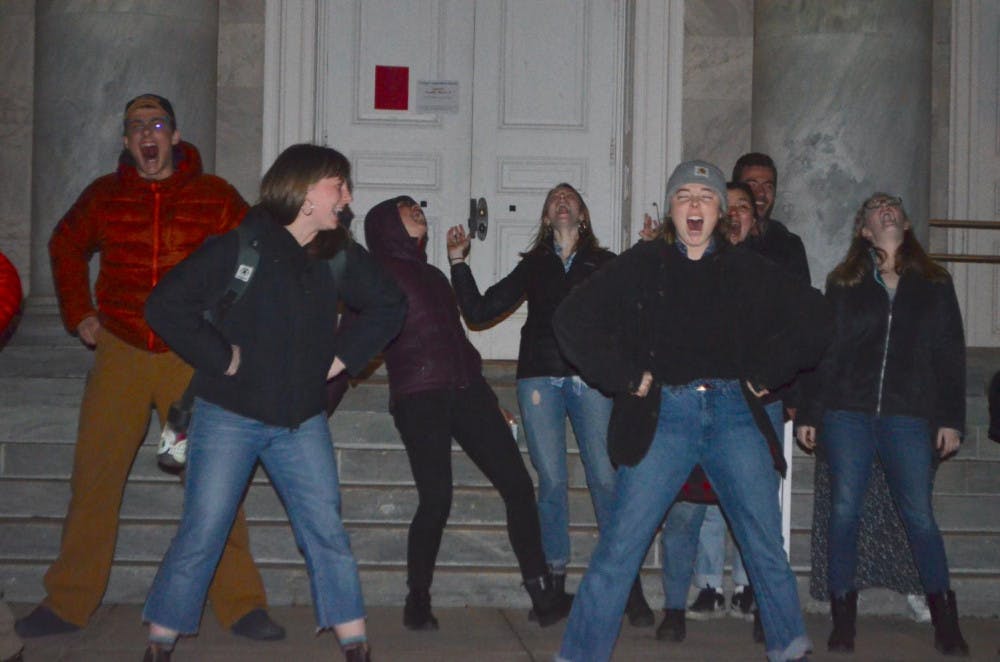UPDATE — Thursday, March 12
The college is now allowing students to stay until Sunday, March 15 at 5:00 p.m., according to an email sent to students and parents yesterday. Students who wish to stay until then, but have already indicated to the school they will leave on or before Friday, should fill out this form indicating their plans.
The email also promised students who are leaving refunds for room and board "for the time students would have been on campus."
"Understanding that students may be returning to campus to finish the semester, we cannot at this time know the amount of the credit or when it will be applied to student accounts," it said.
——
Wednesday, March 11
The college released a series of statements Tuesday afternoon elaborating on next steps following its announcement that it will suspend in-person classes indefinitely after March 13.
Evacuating campus
Students must respond to a form indicating whether they will leave campus or petition to remain on campus for the duration of the semester. The criteria used to determine who can stay on campus will be stricter than for winter break, according to Baishakhi Taylor, vice president for student affairs and dean of students. To gauge whether it is unsafe for a student to return home, the college will consider factors such as travel advisories for those areas.
“This is preventative — we want students in safety sooner rather than later,” said Baishakhi Taylor, vice president for student affairs and dean of students.
Dean of Faculty Sujata Moorti and Provost and Executive Vice President Jeffrey Cason have recommended that professors lighten the workload for their classes as students prepare to leave campus. But the decision ultimately rests in the hands of faculty members.
Middlebury students are required to leave campus by Friday at 8 p.m. Amherst College, which yesterday announced a similar plan to suspend classes and asked students to remain home after spring break, is giving students until next Wednesday to depart campus.
While departing students will not be required to fully move out of their dorm rooms by Friday night, all of their belongings must be packed in boxes and labeled with their name, student ID number and their building name and room number. Boxing materials can be found in Commons Offices. Posters are plastered around campus with the slogan “Box, label & leave.”
Students are encouraged to pack whatever belongings they might need for the remainder of the semester and summer.
The college is currently working with SGA to provide break buses to students. The details are still uncertain, but the college will update students as necessary. The college will also provide eligible students with travel-based financial assistance.
[gallery ids="48987,48988,48989"]
Remote learning
Remote learning, beginning on March 30, will remain in effect until the administration gives further notice. Middlebury will re-evaluate the status of remote learning during the first two weeks of April.
Moorti has confirmed that classes will end as scheduled on May 11 and professors will adjust their syllabi to accommodate the shortened semester.
While some classes are easily transferable to a digital platform, others will be more challenging to shift. Amy Collier, associate provost for digital learning, will be overseeing the remote learning process. Collier cited the unique challenges posed by teaching classes such as language courses and lab sciences remotely.
“We are recognizing that there are some kinds of remote teaching and learning options that are more challenging for faculty and some remote teaching options that are more challenging for students,” Collier said.
Collier is working with faculty on a case-by-case basis to assist professors in translating their classes to a format that will work for both faculty and students.
“We're trying to make recommendations based on what we hope will be very inclusive for students and very manageable for faculty and students and that respond to the teaching goals the faculty are bringing to us,” Collier said.
Moorti explained that the college is considering the possibility of making all classes pass/fail for the remainder of the semester, in response to requests from students and faculty members. “We are looking into the implications, which are more complicated than they appear,” she said.

On Wednesday evening, students gathered outside Mead Chapel at 9 p.m. for a cathartic release: a scream.
Making the call
Consultation with the Center for Disease Control (CDC) and the Vermont Department of Health informed the college’s decision to suspend classes, according to Taylor.
She explained that a myriad of factors — including the inability to control who comes to campus and concerns about students returning from traveling over spring break — impacted the school’s decision.
“We just don't have the capacity — we cannot wait for a case to break on campus because then it's too late in many ways and we are a small school with limited resources,” Taylor said. “The state of Vermont is pretty small. We just don't have the capacity to have testing for everybody and we don't have enough personal protective equipment.”
The Crisis Management Team (CMT) oversees the evolving planning related to Covid-19. The group comprises a variety of stakeholders on campus including Collier, members of the Senior Leadership Group (SLG) and Mark Peluso, director of health services and college and head team physician, among others.
Peluso explained that the college’s decision to suspend in part hinged on a policy of what he called “social distancing.”
“Social distancing is one of the most effective mitigation strategies when pharmaceutical treatments (vaccines, medications) are not available and there is the potential for high numbers of cases,” Peluso wrote in an email to The Campus. “Close living quarters and shared dining facilities place students at higher risk for exposure if there is an illness outbreak
This is a developing story and will be updated accordingly. The Campus will also continue to chart the impact these changes have on the greater Middlebury community over the next few weeks, including how they affect staff, local business owners, and those at the Monterey campus and the C.V. Starr Schools Abroad. Visit middleburycampus.com for updated coverage.
Updates: College details plan to send students home

COURTESY PHOTO
In the wake of the administration's response to Covid-19, students hung signs of resistance on college housing.
In the wake of the administration's response to Covid-19, students hung signs of resistance on college housing.
BENJY RENTON/THE MIDDLEBURY CAMPUS
Comments



